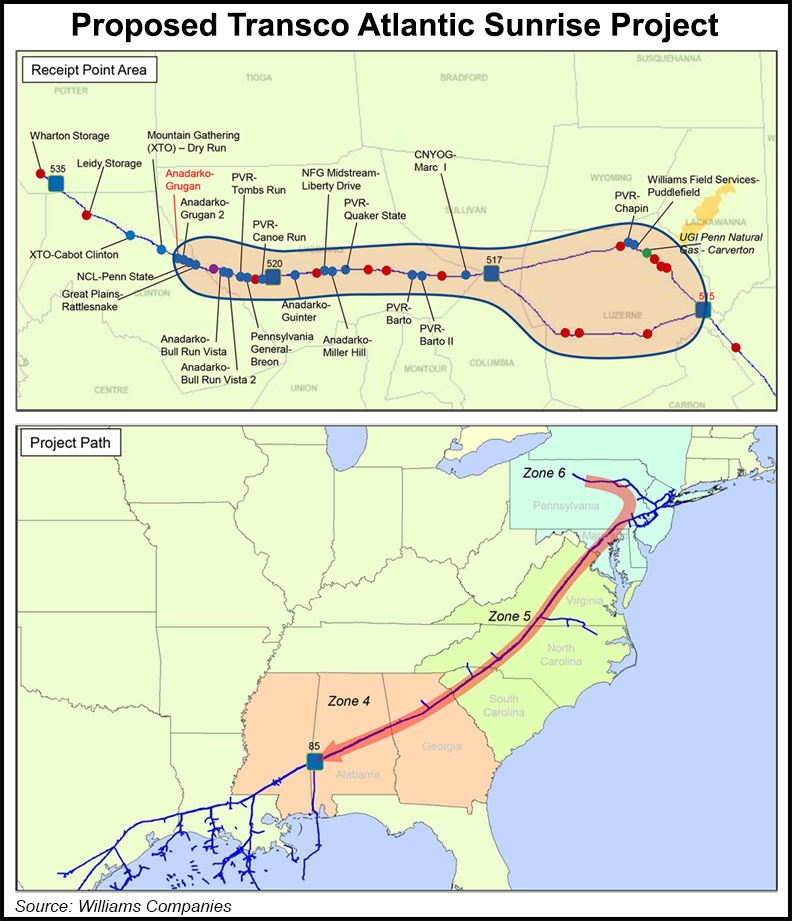Regulatory | Infrastructure | NGI All News Access
Green Groups Take Atlantic Sunrise Challenge Straight to Appeals Court
Citing FERC’s lack of a quorum, a coalition of green groups filed a petition for review in federal appeals court Thursday challenging the approval of the Atlantic Sunrise pipeline project.

The Allegheny Defense Project, the Sierra Club and several other groups asked the U.S. Court of Appeals for the D.C. Circuit to review the Federal Energy Regulatory Commission’s Feb. 3 certificate order for Atlantic Sunrise.
The groups involved in Thursday’s petition, including the Allegheny Defense Project and the Sierra Club, had filed a request for rehearing last month challenging FERC’s decision on the project. Procedure generally requires that FERC must decide on a rehearing request before challengers can make their case in court.
If the Commission doesn’t act on a request within 30 days, it’s considered denied by operation of law. FERC staff issued a tolling order earlier this month to pause the clock and postpone a final decision on all Atlantic Sunrise rehearing requests until the quorum can be restored.
But the groups, after indicating previously that they wouldn’t wait around for FERC, said Thursday that the Commission’s inability to act due to lack of a quorum equates to a denial by operation of law, making their case ready for review by the appeals court.
The rehearing request “was denied by operation of law…because the Commission did not act on the request within 30 days,” they wrote. “Instead, Commission staff issued an invalid ‘tolling order,’ while ‘authority to act on requests for rehearing’ has not been delegated” to staff.
“…A ‘tolling order’ does not constitute an ‘act’ on a request for rehearing under the Natural Gas Act…Thus, this Court has jurisdiction to review” the Atlantic Sunrise certificate order, they wrote.
Atlantic Sunrise, a proposed 1.7 million Dth/d expansion to Transcontinental Gas Pipe Line Co.’s (Transco) system designed to connect Northeast Pennsylvania production to Mid-Atlantic and Southeast markets, was one of the last projects approved in a flurry of FERC activity before former Chairman Norman Bay’s departure Feb. 3.
“By approving the pipeline just minutes before losing its quorum, FERC demonstrated that it was more concerned with meeting the needs of Transco than in determining whether there is a public need for this pipeline,” Appalachian Mountain Advocates attorney Ryan Talbott said Thursday. “…It is unconscionable for agency staff to allow Transco to begin construction before FERC has an opportunity to address the legitimate concerns of landowners impacted by the pipeline through the rehearing process.”
Analysts at ClearView Energy Partners previously anticipated that Atlantic Sunrise opponents might try to leverage FERC’s lack of a quorum in arguments before an appeals court.
“Given the potentially novel legal arguments posed by these parties, we will be watching to see whether any federal appellate court would grant a stay at least long enough to hear what we expect will be motions for preliminary injunction/stays on the pipeline’s construction,” ClearView said earlier this month.
But how long a stay might last if issued remains to be seen, according to the firm, which also noted that “pipeline opponents to date have not been successful in securing stays before the Commission acts on rehearing.”
For its part, Transco issued a response to the rehearing request the groups filed against its project at FERC.
Transco said the certificate order resulted from an “exhaustive” environmental review process and that the groups were “motivated by their views that any natural gas infrastructure is harmful and that environmental considerations outweigh all other public benefits.”
“…It bears emphasis that the Commission conducted an exhaustive review and analysis of the possible environmental impacts of the project, considered comments submitted by various individuals, agencies, and non-governmental organizations, including the comments submitted by movants, and determined that ‘the project, if constructed and operated as described in the application and the final EIS [environmental impact statement], is an environmentally acceptable action,'” Transco wrote.
© 2024 Natural Gas Intelligence. All rights reserved.
ISSN © 1532-1231 | ISSN © 2577-9877 |
